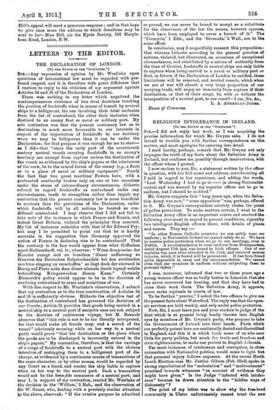LETTERS TO THE EDITOR.
VIE DECLARATION OF LONDON.
[To THY EDITOR OP Till "SPECT1TOR."1 SIE,—Any expression of opinion by Mr. Westlake upon questions of international law must be regarded with pro- found respect, and it is therefore with great diffidence that I venture to reply to his criticism of my argument against Articles 34 and 35 of the Declaration of London.
There was nothing in my letter which negatived the contemporaneous existence of two rival doctrines touching the position of foodstuffs when in course of transit by neutral ships to a belligerent, the one involving their total exclusion from the list of contraband, the other their inclusion when destined to an enemy fleet or naval or military port. My sole contention was that the present customary law as to destination is much more favourable to our interests in respect of the importation of foodstuffs to our territory when we may be belligerent than it can be under the Declaration; for that purpose it was enough for me to state— as I did—that " since the early part of the seventeenth century neutral vessels carrying foodstuffs to an enemy's territory are exempt from capture unless the destination of the vessel, as evidenced by the ship's papers or the admissions of the crew, be to the armed forces of the enemy (e.g., a fleet) or to a place of naval or military equipment." Surely the fact that two great maritime Powers have, with a protracted continuity broken only on one or two occasions under the stress of extraordinary circumstances, hitherto refused to regard foodstuffs as contraband under any circumstances, tends to strengthen rather than impair my contention that the present customary law is more beneficial to neutrals than the provisions of the Declaration, under which foodstuffs will by all nations be treated as con- ditional contraband. I may observe that I did not fail to take note of the instances in which France and Russia, and indeed Great Britain, violated the principles they asserted, My list of instances coincides with that of Sir Edward Fry; but may I be permitted to point out that he is hardly accurate in his suggestion that Germany approved the action of France in declaring rice to be contraband? That the contrary is the fact would appear from what Geffschen apud Holtzendorff, vol. iv., observes : " Wenn demgemaez der Kanzler zusagt sich zu bennihen 'dieser auffassung zu Gunsten des Deutschen Salpeterhandels bei den streitenden roachten eingang zu verschaffen ' so liegt doch der einwand in Bezug auf Preis nahe dasz dieser niemals Burch irgend welche behandlung Kriegszwecken dienen Kann." Certainly Bismarck's policy would appear to be in the direction of confining contraband to arms and munitions of war.
With due respect to Mr. Westlake's observations, I submit that my contention as to the true construction of Articles 34 and 35 is sufficiently obvious. Hitherto the objective test of the destination of contraband has governed the decisions of our Courts ; Article 35 provides that goods being carried in a neutral ship to a neutral port if ancipitis usus are not subject to the doctrine of continuous voyage, but M. Renault observes that "this rule is not to be too literally interpreted, for that would make all frauds easy, and a search of the vessel" (obviously meaning while on her way to a neutral port) would prove "that her destination or the place where the goods are to be discharged is incorrectly entered in the ship's papers." My contention, therefore, is that the carriage of a cargo of foodstuffs to a neutral port with the obvious intention of reshipping them to a belligerent port of dis- charge, as evidenced by a continuous course of transactions of the same character, or by other means, would be regarded by any Court as a fraud, and render the ship liable to capture when on her way to the neutral port. Such a transaction would not be the bona finecommerce of a neutral port; and may I, in support of my contention, remind Mr. Westlake of the decision in the 'William,' 5 Rob., and the observation of Sir W. Grant, who, dealing with a precisely similar situation to the above, observed: "If the evasive purpose be admitted or proved, we can never be bound to accept as a substitute for the observance of the law the means, however operose, which have been employed to cover a breach of it." The Thomyris,' 1 Edw., and the Bermuda,' 5 Wall., are to the same effect.
In conclusion, may I respectfully reassert this proposition: that whereas hitherto according to the general practice of nations, violated, but illustrated, on occasions of exceptional circumstances, and established by a catena of authority from the time of Grotius, foodstuffs in neutral ships are only liable to capture when being carried to a naval or military port or fleet, in future, if the Declaration of London be ratified, these limitations will be removed, and neutral vessels, which when we are at war will absorb a very large proportion of our carrying trade, will enjoy no immunity from capture if their destination, or that of their cargo, be. with or without the interposition of a neutral port, to our coastP—I am, Sir, &c., House of Commons. L. A. ATHERLEY-JONES.










































 Previous page
Previous page